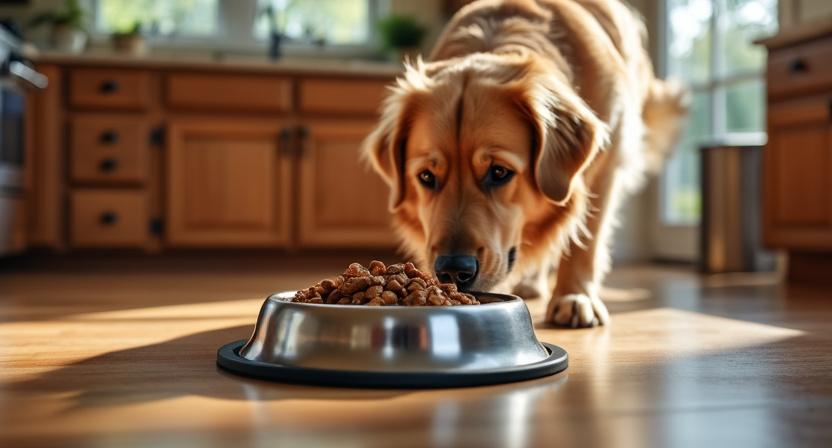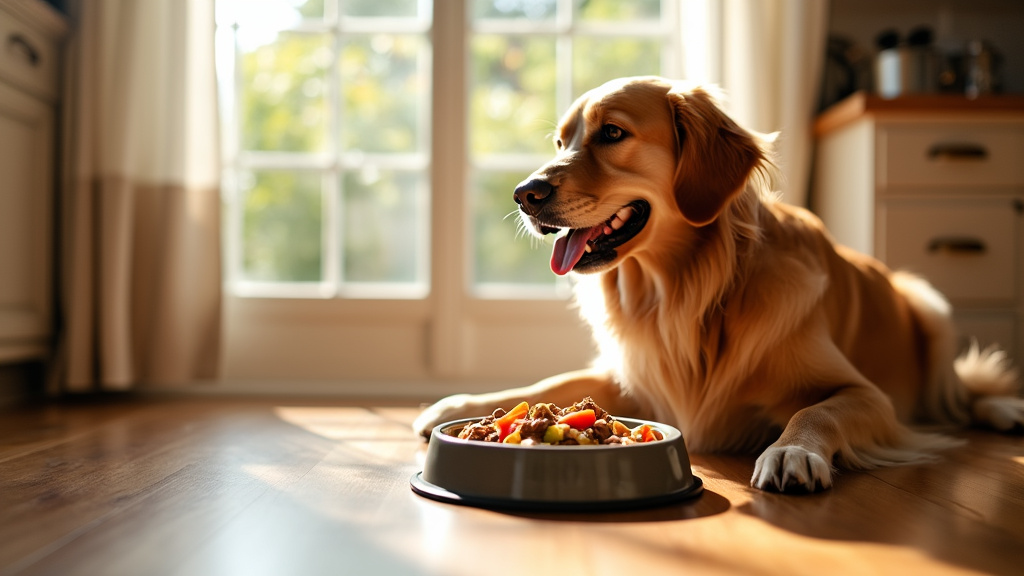Canned dog food provides several benefits for senior dogs, including high water content, soft texture, and specialized nutrition. Top picks for aging canines include Wellness Core Senior, Blue Buffalo Homestyle Recipes, Fromm Family Adult Turkey & Rice Pâté, and Stella & Chewy’s Gourmet Pâté. These options deliver essential nutrients and joint support for older dogs.
Table of Contents
ToggleKey Takeaways:
- Canned food’s high moisture content aids digestion and hydration in senior dogs
- Seek ingredients like glucosamine, chondroitin, and omega-3 fatty acids for joint health and overall wellness
- Shift to new food gradually over 7-10 days
- Custom nutrition and portion control are vital for managing age-related health issues
- Schedule regular vet check-ups to ensure proper nutrition and hydration for aging dogs
Why Canned Dog Food is Ideal for Senior Dogs
Benefits for Aging Canines
Canned dog food offers several advantages for senior dogs. Its high water content supports digestion and keeps older pups hydrated. The soft texture is perfect for seniors with dental problems, making meals enjoyable rather than challenging. For dogs with reduced appetites, the rich flavor of canned food can reignite their interest in eating. I’ve found that many senior dogs eagerly anticipate mealtime when served wet food.
Manufacturers often tailor canned options to meet the specific nutritional needs of older dogs, focusing on key aspects of senior dog nutrition. These formulations typically include:
- Higher protein levels to maintain muscle mass
- Fewer calories to prevent weight gain
- Added vitamins and minerals to support aging joints and cognitive function
Essential Ingredients for Senior Dog Health
Joint Support and Cellular Health
I recommend looking for canned dog food that contains glucosamine and chondroitin. These ingredients are crucial for maintaining joint health and mobility in older dogs. Additionally, antioxidants like vitamins A and E play a vital role in cellular health and can help reduce signs of aging. These nutrients are key senior dog supplements that shouldn’t be overlooked.
Protein and Omega-3 Fatty Acids
High-quality protein sources such as chicken, turkey, and fish are essential for maintaining muscle mass in senior dogs. I also suggest choosing foods rich in omega-3 fatty acids, particularly EPA and DHA. These nutrients support skin and coat health while providing overall benefits for aging canines. By focusing on these key ingredients, you’ll ensure your senior dog receives the nutrition needed for a healthy, comfortable life.
Top Canned Dog Food Choices for Seniors
Premium Options for Aging Canines
I’ve identified several excellent canned food options for senior dogs. Wellness Core Senior stands out with its grain-free formula and high 36% protein content, plus added glucosamine and chondroitin for joint health. Blue Buffalo Homestyle Recipes offers similar joint support and 34% protein, without common allergens. For dogs needing moderate nutrition, Fromm Family Adult Turkey & Rice Pâté provides a single protein source with balanced fat and calorie levels. Stella & Chewy’s Gourmet Pâté caters to sensitive seniors with high-quality protein and no fillers. These options deliver tailored nutrition to support aging dogs’ health and vitality.
Transitioning Your Senior Dog to New Food
Gradual Introduction Process
Switching your senior dog to a new diet requires patience and care. I recommend a slow transition over 7-10 days to prevent digestive upset. Here’s a simple method to follow:
- Day 1-3: Mix 25% new food with 75% current food
- Day 4-6: Increase to 50% new food, 50% current food
- Day 7-9: Use 75% new food, 25% current food
- Day 10: Complete transition to 100% new food
It’s crucial to consult your veterinarian before making any dietary changes, especially for senior dogs who may have specific health needs.
Feeding Schedule Considerations
Establish a consistent feeding routine for your senior pup. Most older dogs do well with two meals a day. However, some health conditions may require adjustments to this schedule. Your vet can provide tailored advice based on your dog’s individual needs.
Remember, senior dogs often have different nutritional requirements than their younger counterparts. The right diet can help manage age-related issues and keep your furry friend healthy and happy in their golden years.
Tailoring Your Senior Dog’s Diet
Personalized Nutrition for Aging Canines
I’ve found that creating a personalized diet for senior dogs is crucial. It’s important to consider any health conditions your older pup might have when selecting their food. For example, if they’re battling joint issues, look for canned options with added glucosamine. Portion control is key too – adjust serving sizes based on your dog’s activity level and weight management needs. As you introduce new foods, keep a close eye on your furry friend’s response. Some signs to watch for include:
- Changes in energy levels
- Stool consistency
- Coat quality
Regular vet visits are essential to assess your senior dog’s changing nutritional requirements. Your veterinarian can provide tailored advice, ensuring your canine companion gets the right balance of nutrients as they age.
The Importance of Hydration for Senior Dogs
Benefits of Canned Food’s Moisture Content
Canned dog food plays a crucial role in maintaining hydration for senior dogs. Its high moisture content supports kidney function and overall health, making it an excellent choice for older canines. I recommend encouraging additional water intake alongside meals to further boost hydration levels.
Monitoring and Enhancing Hydration
Keep a close eye on your senior dog’s water consumption and urine output. This helps you spot any potential issues early on. If you’re mixing canned food with dry kibble, consider adding extra water to the dry food. This simple step can significantly increase your dog’s fluid intake, supporting their health as they age. Remember, proper hydration is key to keeping your senior dog happy and healthy.
Sources:
Whole Dog Journal
Chewy
Gentle Doctor
Frequently Asked Questions
Why is canned dog food beneficial for senior dogs?
Canned dog food offers high water content for hydration, soft texture for dental issues, rich flavor to stimulate appetite, and tailored nutrition for senior dogs’ specific needs.
What key ingredients should I look for in canned food for senior dogs?
Look for glucosamine and chondroitin for joint health, antioxidants for cellular health, high-quality protein sources, and omega-3 fatty acids for skin and coat health.
How should I transition my senior dog to new canned food?
Transition slowly over 7-10 days, gradually increasing the proportion of new food while decreasing the old food. Consult your veterinarian before making dietary changes.
How often should I feed my senior dog?
Most senior dogs do well with two meals a day, but consult your veterinarian for a feeding schedule tailored to your dog’s specific needs.
Can canned food help with my senior dog’s hydration?
Yes, canned food’s high moisture content supports hydration and kidney function in senior dogs. You can also add water to dry kibble to increase fluid intake.
How can I personalize my senior dog’s diet?
Consider your dog’s health conditions, adjust portion sizes based on activity level and weight management needs, and consult with your veterinarian for tailored advice.
What signs should I watch for when introducing new food to my senior dog?
Monitor changes in energy levels, stool consistency, and coat quality when introducing new foods to your senior dog.












